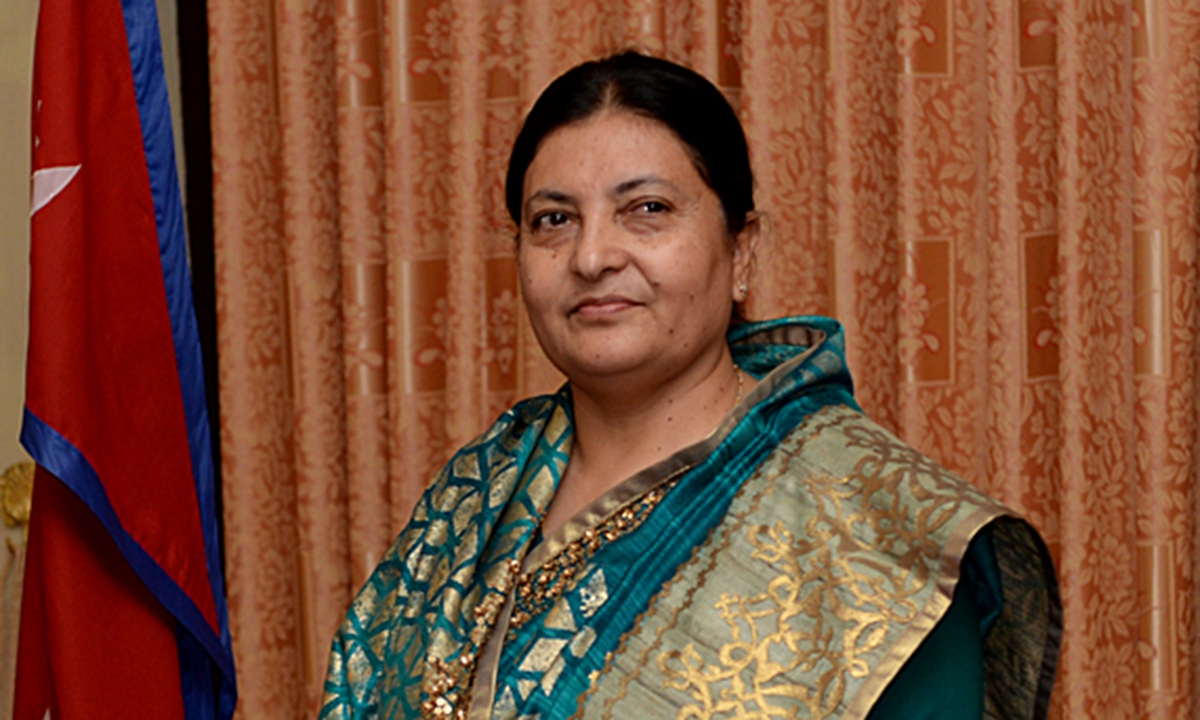Justice Manoj Kumar Sharma will hear the writ petitions filed against President Bidya Devi Bhandari's refusal to authenticate the Citizenship Bill that was sent to her again after being passed by both Houses of the federal parliament for a second time.
Advocates Sunil Ranjan Singh, Sagar Baral and three others have submitted separate petitions pointing that President Bhandari has blatantly violated parliamentary supremacy and the Constitution by refusing to authenticate the bill sent to her for the second time after being passed by both Houses of the federal parliament.
The petitions have been assigned to the bench of Sharma for hearing on Friday.
The petitioners have demanded a mandamus instructing President Bhandari to authenticate the bill, SC spokesperson Bimal Paudel said.
President Bhandari refused to authenticate the Citizenship Bill sent to her again after being passed by both Houses of Parliament for a second time.
As per Article 113 (3) of the Constitution, the president can send back a bill passed by the federal parliament for reconsideration once.
“In case the President is of the opinion that any Bill, except a Money Bill, presented for authentication needs reconsideration, he or she may, within fifty days from the date of submission of such Bill, send back the Bill along with his or her message to the House in which the Bill originated,” it says about exception to mandatory certification of bills sent to the president.
However, Article 113 (4) requires the president to authenticate any bill sent for a second time after being passed by both Houses of Parliament.
“In case any Bill is sent back along with a message by the President, and both Houses reconsider and adopt such Bill as it was or with amendments and present it again, the President shall authenticate that Bill within fifteen days of such presentation,” it states.
President Bhandari refused to authenticate the bill violating that provision as the 15-day deadline to certify the bill ended on Tuesday midnight.
On August 14, she had returned the Citizenship Bill sent to her for authentication after being passed by both the House of Representatives (HoR) and the National Assembly. She had sent a seven-point message to inform the federal parliament and for deliberation, and another eight-point message for drawing attention.
Spokesperson at the President's Office Sagar Acharya issuing a statement had said that President Bhandari had sent back the bill to the HoR for reconsideration as per Article 113 (3) of the Constitution.
President Bhandari had mainly raised two issues while sending the bill back. She had mentioned that the bill was silent about the provision of naturalized citizenship through marriage as per Article 11 (6) of the Constitution.
"If a foreign woman married to a Nepali citizen so wishes, she may acquire naturalized citizenship of Nepal as provided for in a Federal law," states Article 11(6) of the Constitution. President Bhandari had pointed that the Constitution clearly says federal law but the bill passed by the federal parliament did not have that provision.
She had also raised question about the provision requiring self-declaration by a woman to provide citizenship to her children.
She had also drawn the House's attention to other issues but had mainly asked the House to reconsider the two issues.
The bill does not propose any restrictions on foreigners marrying Nepali citizens while acquiring naturalized citizenship. The main opposition CPN-UML, to which Bhandari was affiliated before becoming president, has been protesting removal of the provision in the report submitted by the State Affairs and Good Governance Committee of the HoR that required foreigners marrying Nepali citizens to wait for seven years to get naturalized citizenship.
The bill passed by the federal parliament also has a provision to grant citizenship by descent to the children of those who received citizenship by birth through a one-time arrangement after the Janaandolan II in 2006.
Citizenship by birth was granted to persons born in Nepal before mid-April 1990, and having permanent domicile and been continuously resident in Nepal throughout their life through the one-time arrangement.
The passed bill also allows citizenship to a person only through the name of mother but has put four conditions for that. The child should be born in Nepal, should be residing in Nepal, father should be unidentified and the person should make self-declaration that the father has not been identified for that.
The person taking the citizenship certificate can choose to take the surname and address of either the father or mother. The bill has also paved the way for non-resident citizenship to anyone living outside the SAARC countries if there is proof that the person's father/mother or grandfather/grandmother is/was a Nepali citizen.
President Bhandari had earlier authenticated an ordinance, sent by the then prime minister KP Sharma Oli after dissolving the House, that included similar provisions.

